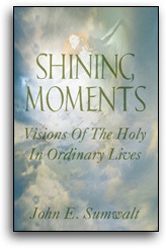SermonStudio
Holy Hands
Stories
Shining Moments
Visions Of The Holy In Ordinary Lives
David Michael Smith
Five years shy of a century, my grandfather, Oscar Bailey, felt old. Ironically, you would think that would be natural, but then again, you'd have to personally know Oscar. Old age and the man never meshed. It was as if he had discovered the fountain of youth, if not physically, then mentally, and would live forever.
Five years shy of a century, my grandfather, Oscar Bailey, felt old. Ironically, you would think that would be natural, but then again, you'd have to personally know Oscar. Old age and the man never meshed. It was as if he had discovered the fountain of youth, if not physically, then mentally, and would live forever.


